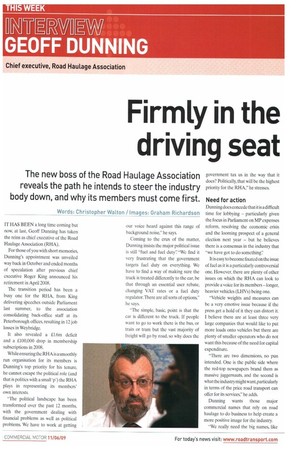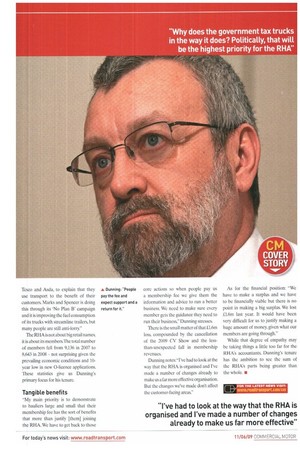Firmly in the driving seat
Page 18

Page 19

If you've noticed an error in this article please click here to report it so we can fix it.
The new boss of the Road Haulage Association reveals the path he intends to steer the industry body down, and why its members must come first.
Words: Christopher Walton / Images: Graham Richardson IT HAS BEEN a long time coming but now, at last. Geoff Dunning has taken the reins as chief executive of the Road Haulage Association (RHA).
For those of you with short memories. Dunning's appointment was unveiled way back in October and ended months of speculation after previous chief executive Roger King announced his retirement in April 2008.
The transition period has been a busy one for the RHA, from King delivering speeches outside Parliament last summer, to the association consolidating back-office staff at its Peterborough offices, resulting in 12 job losses in Weybridge.
It also revealed a £1.6m deficit and a £100,000 drop in membership subscriptions in 2008.
While ensuring the RHA is a smoothly run organisation for its members is Dunning's top priority for his tenure, he cannot escape the political role (and that is politics with a small 'p') the RHA plays in representing its members' own interests.
"The political landscape has been transformed over the past 12 months. with the government dealing with financial problems as well as political problems We have to work at getting our voice heard against this range of background noise.he says.
Coming to the crux of the matter, Dunning insists the major political issue is still "fuel and fuel duty': "We find it very frustrating that the government targets fuel duty on everything. We have to find a way of making sure the truck is treated differently to the car, be that through an essential user rebate, changing VAT rates or a fuel duty regulator.There are all sorts of options," he says.
"Ile simple, basic. point is that the car is different to the truck. If people want to go to work there is the bus, or train or tram but the vast majority of freight will go by road, so why does the government tax us in the way that it does? Politically, that will be the highest priority for the RHA," he stresses.
Need for action Dunning does concede that it is a difficult time for lobbying — particularly given the focus in Parliament on MP expenses reform, resolving the economic crisis and the looming prospect of a general election next year — but he believes there is a consensus in the industry that "we have got to do something'.
It is easy to become fixated on the issue of fuel as it is a particularly controversial one. However, there are plenty of other issues on which the RHA can look to provide a voice for its members — longer, heavier vehicles (LHVs) being one.
"Vehicle weights and measures can be a very emotive issue because if the press get a hold of it they can distort it. I believe there are at least three very large companies that would like to put more loads onto vehicles but there are plenty of smaller operators who do not want this because of the need for capital expenditure.
"There are two dimensions, no pun intended. One is the public side where the red-top newspapers brand them as massive juggernauts, and the second is what the industry might want, particularly in terms of the price road transport can offer for its services," he add& Dunning wants those major commercial names that rely on road haulage to do business to help create a more positive image for the industry.
"We really need the big names, like Tesco and Asda, to explain that they use transport to the benefit of their customers. Marks and Spencer is doing this through its 'No Plan B' campaign and it is improving the fuel consumption of its trucks with streamline trailers, but many people are still anti-lorry."
The RHA is not about big retail names, it is about its members.The total number of members fell from 9,136 in 2007 to 8,643 in 2008 — not surprising given the prevailing economic conditions and 10year low in new 0-licence applications. These statistics give us Dunning's primary focus for his tenure.
Tangible benefits
"My main priority is to demonstrate to hauliers large and small that their membership fee has the sort of benefits that more than justify [them] joining the RHA. We have to get back to those core actions so when people pay us a membership fee we give them the information and advice to run a better business. We need to make sure every member gets the guidance they need to run their business," Dunning stresses.
There is the small matter of that £1.6m loss, compounded by the cancellation of the 2009 CV Show and the lessthan-unexpected fall in membership revenues.
Dunning notes: "I've had to look at the way that the RHA is organised and I've made a number of changes already to make us a far more effective organisation. But the changes we've made don't affect the customer-facing areas." As for the financial position: "We have to make a surplus and we have to be financially viable but there is no point in making a big surplus. We lost £1.6m last year. It would have been very difficult for us to justify making a huge amount of money, given what our members are going through."
While that degree of empathy may be taking things a little too far for the RHA's accountants, Dunning's tenure has the ambition to see the sum of the RHA's parts being greater than the whole. • (7. FOR THE LATEST NEWS VISIT:
•
















































































































































